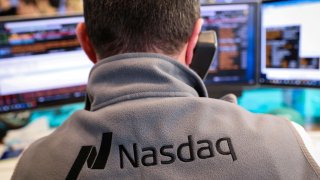
Big Tech is bouncing back.
Technology names partially recovered from a vicious sell-off in the latter part of Tuesday's trading session, though all three of the major averages remained in the red.
Many market analysts saw this coming, but some were split on how much investors should worry about tech's pullback.
Get New England news, weather forecasts and entertainment stories to your inbox. Sign up for NECN newsletters.
Here's what five of them told CNBC amid Tuesday's action:
Duquesne Family Office CEO Stanley Druckenmiller said the market's "mania" could push his firm out of equities by the end of 2021:
"I have no doubt, none whatsoever, that we are in a raging mania in all assets. I also have no doubt that I don't have a clue when that's going to end. I knew we were in a raging mania in '99 and it kept going on and if you had shorted tech stocks, say, in mid-'99, you were out of business by the end of the year. But we are still long the stock market. We're not as long, nearly as long, as we were four or five months ago. We're still playing the game. We've shifted a lot of our relative bets into commodities, into interest rates, into the dollar. All those shifts occurred last, say, August to October when it became clear to us that the recovery was going. But I will be surprised if we're not out of the stock market by the end of the year."
Money Report
Tom Lee, head of research at Fundstrat Global Advisors, flagged five headwinds facing Big Tech:
"There have been five headwinds for tech that feel like they're coming to a head. … One of the overarching problems with tech starting this year is it's a crowded and stale long. People piled into these names last year because of the collapse of the economy and the pandemic, but now we have potential inflation building, interest rates going up. The White House could go after technology. The economy, not everyone believes it, but it looks like we're set for a full reopen by June. And then capital gains could go up. Five of five of these is bad for the technology and growth trade, especially capital gains. More than 70[%] or 80% of all capital gains are just in a handful of sectors. And on the other hand, the epicenter trade wins on five of five of these. So, if only one or two of these flips and in fact happens, epicenter stocks are to keep rallying and tech can weaken."
Lew Piantedosi, vice president and co-director of growth equity at Eaton Vance Management, also highlighted several obstacles for tech:
"I think that the sell-off is justified given the meteoric rise that a lot of these stocks exhibited, particularly post the initial stages of Covid. And given where we are right now, there's four real headwinds to most areas of tech, and namely the fear of higher rates, tougher comparisons going forward, particularly for those that have benefited from Covid, corporate tax reform, which is something that isn't being discussed right now, but it will have an impact on tech more so than other areas of the market, and then lastly, particularly for mega-cap tech, I think we're seeing more and more antitrust headwinds starting to pick up as well. So, all of those headwinds kind of come together at a time where there's other areas of the market that will benefit from a recovering economy that had been neglected by the market for the last few years and now are starting to see a real resurgence."
Ritholtz Wealth Management CEO Josh Brown, who is also a CNBC contributor, said the market was producing a kind of "wealth effect":
"All of the inflation that you're seeing right now is being driven by the wealth effect from the stock market. So, if there's enough fear about inflation or if the Fed is somehow forced to act quickly or forcefully — which I don't think they're going to do, but let's just say that's the thing you're worried about and that's the thing that's producing volatility in the stock market — well, that's great, because it's a self-correcting system. The Fed will move or the market will move or both. That will take the juice out of the stock market. No more inflation problem. Everybody that you know that's remodeling their house – why do you think they're doing that? Because their 401(k) became a 601(k) and they had to cancel a whole bunch of activities during the pandemic, which saved them money. All of the wealth effect is coming from the stock market. So, if you think inflation is a threat, just understand something: If stocks cool off, that threat will be neutralized. People will come right back to this idea of, 'Well, what else do I do with my money?' and go right back into stocks."
Victoria Fernandez, chief market strategist at Crossmark Global Investments, said investors shouldn't worry just yet:
"I'm not sure I would say it's cause for concern. I do think you have to pay attention to what's going on in the markets right now, but we really feel like the markets have just kind of gotten a little heavy, to use a word of one of my colleagues. The months leading up to now, we've seen the trend higher. We've had a really strong earnings season. I mean, you look at the [earnings per share] growth and we're going to be double what expectations were a couple months ago. So, I think the market has gotten a little bit heavy, so, having a pullback, having a little consolidation, is OK. We actually think that [the] tech sector, led by some of those high-flying names to the downside, maybe that's getting to a bottom right now and if you don't own them it could be a buying opportunity. But we really like looking at more of some of those secular growth names. It can still be in the tech area. It could be a name like an Nvidia or a name like Adobe. But we don't think there's cause for extreme concern for the entire sector."






